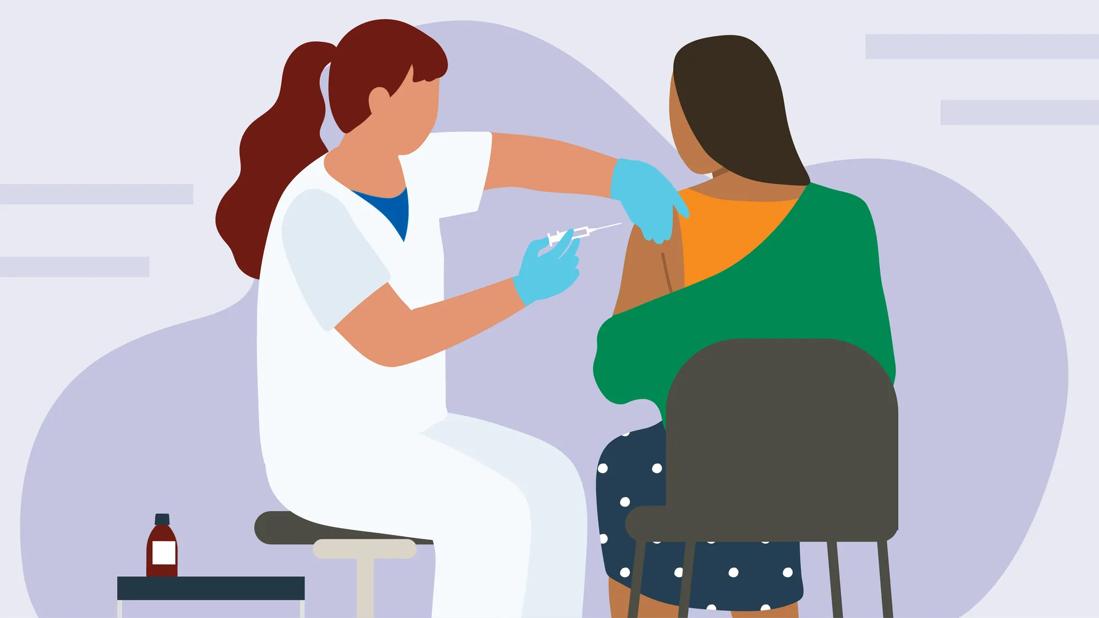Rolling up your sleeve in September or October is ideal — but it’s never too late to get your flu shot

Guarding against the flu is a lot easier than treating it. And one of the best ways to avoid falling sick is by getting your annual flu shot.
Advertisement
Cleveland Clinic is a non-profit academic medical center. Advertising on our site helps support our mission. We do not endorse non-Cleveland Clinic products or services. Policy
Infectious disease specialist Steven Gordon, MD, and infectious disease clinical pharmacist Kaitlyn Rivard, PharmD, share the best time to get a flu shot and other factors to consider.
Influenza is seasonal, so preventing it requires some scheduling.
“After you get the flu shot, it takes about two weeks for your body to build up the antibodies it needs to protect you,” Dr. Gordon explains. “So, it’s a good idea to get the injection before respiratory season starts.”
In the U.S. northern hemisphere, flu season typically starts in October and peaks between December and February. It peters out around May.
Flu shots are annual because the virus mutates over time, creating different strains. Getting it done every year is the best possible way to protect yourself against the flu of the future.
So, when is the best time to get a flu shot?
Dr. Gordon advises getting it as soon as it becomes available in your area. Many healthcare providers begin offering the jab at the beginning of September. In an ideal world, you want to receive the injection by the end of October, at the latest, so the antibodies have kicked in by the start of flu season.
While September is typically the best month to get immunized against influenza, there are exceptions. Here are some other factors that may affect the timing.
Advertisement
Children get shots so often that it can be hard to keep track of what they need and when. Here are a couple of things to keep in mind about scheduling your kid’s yearly flu shot:
If you have questions about the timing — if, say, your child will turn 6 months old in February — talk to their pediatrician.
Your immune system weakens as you age, so the U.S. Centers for Disease Control and Prevention (CDC) recommends that people over 65 get a flu shot specifically formulated to provide extra protection. Ask your provider or pharmacist which one they recommend for you and when they’d like you to get it.
“Rest assured that it’s safe to get a flu shot at any time during your pregnancy,” Dr. Rivard clarifies. “In fact, it’s even more important than it usually is because your risk of hospitalization and death goes up if you get the flu while pregnant.”
Bonus: The antibodies you create in response to the flu shot could also provide your baby with a little extra protection in those first six months of life — before they can get the flu jab themselves.
Pregnancy doesn’t follow a set schedule. And the timing of your flu shot may change alongside your delivery date. If, for example, you’re due in September, you may want to ask if it’s possible to be immunized a bit earlier.
If your immune system doesn’t work as well as it should, getting a flu shot is crucial — but the “when” may depend on your health situation.
For example, if your immune system is being suppressed by a medical treatment like chemotherapy, have a conversation with your provider. They’ll help you figure out how best to time your injection.
If September’s already in the rearview mirror as you’re reading this, the best time to get your flu shot is right now.
“It takes a couple of weeks to get the full benefit, but any protection is better than none,” Dr. Gordon states. “Influenza can also come in waves. So, it’s never too late to protect yourself and others against it.”
If you’ve already had the flu, wait until you’ve been symptom-free for two weeks before rolling up your sleeve.
It may seem like a waste to get a flu shot after you’ve had the flu, but Dr. Rivard reassures that’s not the case.
“At any given time during respiratory season, there are multiple different strains of influenza circulating,” she explains. “Getting a flu shot after you’ve been sick can still help protect you against the other strains. And if you do get sick again, it may help protect you against severe illness.”
Advertisement
The flu shot won’t interfere with the immunizations you get to protect against COVID-19 or RSV — and getting them all at once won’t overload your immune system.
“You’re always being exposed to things that stimulate your immune system,” Dr. Rivard says. “It’s constantly responding to various exposures, even if you don’t realize it.”
Dr. Gordon adds that it’s also worth defending yourself against the risk of co-infection, which is when you come down with multiple illnesses at once.
“Influenza, RSV, COVID-19 and more coexist during respiratory season,” he notes. “And if you get sick with two or more respiratory infections at the same time, your risk of serious illness goes up.”
So, don’t be afraid to circle that date on the calendar a couple times over!
Advertisement
Learn more about our editorial process.
Advertisement

Doctors say that vaccination is an effective way to guard against influenza — and that it cannot give you the virus

Getting vaccinated prevents the spread of illness

When it makes sense to delay your flu shot — and when it doesn’t

The guidelines have changed — here's what you should know

They can feel similar, but the differences matter — especially if you’re at higher risk for complications

This fruit has clear nutritional benefits — but there’s little evidence it can prevent or treat illness

Follow these tips, like hand washing and self-care, to keep illness at bay as you celebrate the season

Options like fatty fish, citrus fruits and sunflower seeds can help keep you well and heal faster

Wearing a scarf, adjusting your outdoor activities and following your asthma treatment plan can help limit breathing problems

Your diet in the weeks, days and hours ahead of your race can power you to the finish line

When someone guilt trips you, they’re using emotionally manipulative behavior to try to get you to act a certain way